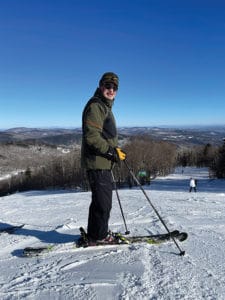By Katy Savage
Anthony Cosentino lay in a hospital with a pump connecting his leg to his heart to keep him alive. His muscle mass was gone and 90% of his heart had stopped functioning, but he remembers telling his doctors, “I’m going to ski again.”
Killington has been his go-to ski place since he was 5.

Anthony Cosentino skiing after his heart transplant.
“That was one of my goals — to be healthy enough to get back on the hill,” said Cosentino, 53, who lives in Staten Island. “Skiing is something that’s in my DNA, it’s in my blood,” Cosentino said. “That was part of my goal. I wanted to get back to a normal life, which is why I went through the hell I went through.”
About 18 months after having a heart transplant, Cosentino met his goal in January. He and a group of friends skied down Killington. They had signs made, calling Cosentino the “miracle man.”
Cosentino had a heart attack in July 2020. He said what started as a normal day ended in almost complete heart failure, with a 55-day stay in the hospital in the midst of a pandemic. Cosentino doesn’t remember a lot, but he remembers having pain in his left arm. He thought nothing of it.
“I thought I had laid on the couch the wrong way and pinched a nerve so it didn’t hit home right away,” said Cosentino who explained he was generally healthy and had an active job as a maintenance person at the Port Authority of New York and New Jersey. “I didn’t think it was a heart attack.”
But the pain didn’t stop. Cosentino spent 15 minutes in the emergency room in Staten Island before doctors determined he needed emergency surgery. Doctors told Cosentino he had a widowmaker, an informal term for a heart attack that is usually fatal and involves complete blockage in the left anterior descending artery. Cosentino said he flatlined twice during emergency surgery.
“I was cheating death more than once in the same day,” Cosentino said.
Cosentino said doctors installed stents to see if his heart would come back, but it didn’t. When he woke up, Cosentino was intubated. He couldn’t write or speak.
“I’m just laying there with a medieval torture device down my throat,” he said. “I could barely hold a pen and scribble a word.”
The only thing he could do was wait for a heart transplant.
Cosentino remembers getting the call on a Sunday. Someone had a drug overdose over Labor Day weekend in 2020. Cosentino doesn’t know a lot about his donor, but he said his new heart came from anywhere from Long Island to Virginia. The heart had a Hepatitis-C infection, but the blood type and size of the organ fit. For Cosentino, it was his only option.
Hepatitis-C has been treatable since 2014. The research on Hep-C heart transplants is limited but a study released in January 2020 by the Journal of the American Heart Association shows the survival rate for those with Hep-C heart transplants is about the same as hearts that don’t have Hep-C.
After 10 hours of surgery, Cosentino said the recovery process after the transplant was long. Cosentino couldn’t hold a gallon of milk.
“I had to go grocery shopping with friends because I couldn’t hold the packages,” he said.
Walking upstairs was also a challenge.
“I started doing one step and that was it — I was done for an entire day,” Cosentino said.
It took three weeks before he could walk up a flight of stairs.
“It really is a miracle that he’s here, we’ve been joking, calling him the miracle man,” said Tamara, Cosentino’s wife of 24 years said. They have three kids, ages 12, 14 and 18.
Cosentino said his desire to ski again got him through the most difficult moments.
When he finally got back on skis, his childhood friend Lorraine Fauver, who skis every weekend in Killington, had signs made for him with a picture of him and the words “Miracle Man.”
“He got to the bottom and I gave him a big hug and started crying,” Fauver said.
Cosentino and Fauver have known each other since they were 4 years old and grew up two houses away. They grew up going to Killington together.
“He was 10 minutes away from not being here,” Fauver said.
Fauver wasn’t able to visit Cosentino in the hospital due to Covid protocols. She didn’t know if she’d see him again. Fauver said skiing with him was emotional.
“It was so big for his mental strength,” Fauver said. “It was such an accomplishment for him. It was something he wanted to do.”
Cosentino still has some side effects from his new heart. He has no feeling in his fingers due to permanent nerve damage. And he had to have botox injections on his vocal cords due to damage from being incubated.
“A slow price to pay to being dead,” Cosentino said.
“My three fingers are dead but I’m going to live for the next 40 years.”
Aside from not being able to have much salt or sugar, “I’m doing well. I’m getting stronger,” Cosentino said. “My body is still achy from skiing over the weekend but it’s a happy soreness.That to me was a sign that I’m getting back to a regular normal life.”




